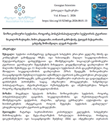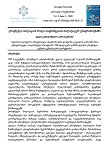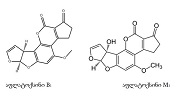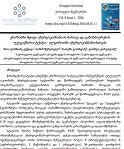Problems of Prioritization National Security interest of Energy import-dependent States (Case studies: Georgia and Lithuania)
Downloads
This paper focuses on studying the prioritization process of national interests of energy import-dependent states. In particular, considering the energy strategy formation processes of Georgia and Lithuania, it explores the interrelation among the objectives of supply security and national security challenges. The reason behind the choice of the given countries was that energy security policies of both countries were formed based on identical characteristics after the collapse of the Soviet Union. Analysis of the mentioned cases offers a good opportunity to explain how foreign policy threats affect national energy security decisions. The study also examines the major factors affecting prioritization of national security interests, providing a possibility to answer the main research question of the paper - what prompts states to pursue less rational policies in terms of energy security, justified by maintaining state sovereignty? Using the securitization concept, the paper also explains what leads to taking steps aimed at solving national security challenges, which may, in turn, lead to the emergence of new types of security challenges. Analysis of the mentioned cases offers a good opportunity to explain how foreign policy threats affect national energy security decisions, whether such threats cause new energy challenges to be subject to political interests and whether it is appropriate for states to pursue such energy policy with the motive of maintaining state sovereignty. The paper indicates that energy policies purely formed based on political interests, may not face the main energy security challenges of the country.
Downloads
Barton, B., Redgwell, C., Rønne, A., & Zillman, D. N. (2004). Energy Security: Managing Risk in a Dynamic Legal and Regulatory Environment. In Google Books. Oxford University Press. https://books.google.ge/books/about/Energy_Security.html?id=ZKsTFgArP50C&printsec=frontcover&source=kp_read_button&redir_esc=y#v=onepage&q&f=false
Buzan, B. (1991). People, states and fear: an agenda for international security in the post-Cold War era. Pearson Longman.
Buzan, B., Waever, O., & De Wilde, J. (1998). Security a new framework for analysis. Boulder, Colo. Lynne Rienner.
Česnakas, G. (2012). Energy Security in the Baltic-Black Sea Region: Energy Insecurity Sources and their Impact upon States. Lithuanian Annual Strategic Review, 10(1), 155–197. https://doi.org/10.2478/v10243-012-0016-1
Chomakhidze, D. (2016). Georgia in World Power System. Globalization & Business. https://www.eugb.ge/view_archive2.php?content=content&id=52&Georgia%20in%20World%20Power%20System
Electricity Market Operator. (2020). Electricity Balance 2020. Retrieved August 27, 2021, from https://esco.ge/en/energobalansi/by-year-1/elektroenergiis-balansi-2020
Georgian National Energy and Water Supply Regulatory Commission (GNERC). (2021). Annual reports - GNERC. Gnerc.org. https://gnerc.org/en/commission/commission-reports/tsliuri-angarishebi
Gochitashvili, T. (2020). Oil and Gas Sector of Georgia in the Transition Period. https://sarmatia.com.pl/publications/?lang=en
Grigas, A. (2012). The Gas Relationship between the Baltic States and Russia: politics and commercial realities https://www.oxfordenergy.org/wpcms/wp-content/uploads/2012/10/NG_67.pdf
INlS-mf -147 IC Consult ERM Energy Limited COWI consult (with Technical Assistance of EC-PHARE) and Lithuanian Energy Institute Republic of Lithuania National Energy Strategy Volume I: The Strategy Final Report VOL. (1993). https://inis.iaea.org/collection/NCLCollectionStore/_Public/27/026/27026649.pdf
International Energy Agency (IEA). (2020). Georgia 2020 – Analysis. IEA. https://www.iea.org/reports/georgia-2020
Jakniūnaitė, D. (2015). A Small State in the Asymmetrical Bilateral Relations: Lithuania in Lithuanian — Russian Relations since 2004. Baltic Journal of Political Science, 4, 70. https://doi.org/10.15388/bjps.2015.0.8880
Janeliūnas, T. (2020). Energy transformation in Lithuania: Aiming for the grand changes. From Economic to Energy Transition, 283–313. https://doi.org/10.1007/978-3-030-55085-1_10
Janeliunas, T., & Tumkevic, A. (2013, December 01). Securitization of the energy sectors in Estonia, Lithuania, Poland and Ukraine: Motives and extraordinary measures. Retrieved from https://www.researchgate.net/publication/259761211_Securitization_of_the_energy_sectors_in_Estonia_Lithuania_Poland_and_Ukraine_Motives_and_extraordinary_measures
Jens Hetland, & Teimuraz Gochitashvili. (2004). Security of natural gas supply through transit countries. Kluwer Academic.
Jervis, R. (2017). Perception and misperception in international politics. Princeton Oxford Princeton University Press.
Kalicki, J. H., & Goldwyn, D. L. (2013). Energy and security: strategies for a world in transition. Woodrow Wilson Center Press.
Komakhia, M. (2017) South Caucasus Energy Corridor-Perspectives and Challenges. Www.academia.edu. Retrieved August 27, 2021, from https://www.academia.edu/33308239/South_Caucasus_Energy_Corridor-Perspectives_and_Challenges
Kauppi, M. V., & Viotti, P. R. (2020). International relations theory. Lanham; Boulder; New York; London Rowman ET Littlefield.
Larsson, R. (2007). Nord Stream, Sweden and Baltic Sea Security. https://inis.iaea.org/collection/NCLCollectionStore/_Public/39/015/39015071.pdf
Ministry of Economy and Sustainable Development of Georgia. (2019). National Renewable Energy Action Plan (NREAP) Georgia Unofficial Translation. Ministry of Economy and Sustainable Development of Georgia. http://www.economy.ge/uploads/files/2017/energy/samoqmedo_gegma/nreap_v_3_eng_21022020.pdf
National Energy Regulatory Council. (2020). VKEKK Report to the European Commission. Www.regula.lt. https://www.regula.lt/en/Pages/report-to-the-european-commission.aspx
National Statistics Office of Georgia (GeoStat). (2020). Energy Balance of Georgia 2020. Www.geostat.ge. https://www.geostat.ge/en/single-archive/3350
Nye, J. S., & Lynn-Jones, S. M. (1988). International Security Studies: A Report of a Conference on the State of the Field. International Security, 12(4), 5. https://doi.org/10.2307/2538992
Pakalkaité, V. (2016). Lithuania’s Strategic Use of EU Energy Policy Tools: A Transformation of Gas Dynamics. https://www.europeangashub.com/wp-content/uploads/attach_671.pdf
Papava, V. (2010). The economic challenges of the Black Sea region: The global financial crisis and energy sector cooperation. ResearchGate. https://www.researchgate.net/publication/254227444_The_economic_challenges_of_the_Black_Sea_region_The_global_financial_crisis_and_energy_sector_cooperation
Puheloinen, A. (1999). Russia’s Geopolitical Interests in the Baltic Area. https://core.ac.uk/download/pdf/39961721.pdf
Purvins, A., Fulli, G., Covrig, C.-F., Chaouachi, A., Di, P., Ettore, T., Bompard, F., Carpaneto, E., Huang, T., & Pi, R. (2016). JRC Institute for Energy and Transport, First Results from a Security Analysis and Insights for Future Work the Baltic Power System Between East and West Interconnections. 2016 EUR 27762 EN. https://core.ac.uk/download/pdf/38632048.pdf
Roehrs, P. (2005). Weak States and Implications for Security: A case Study of Georgian Instability and Caspian Regional Insecurity. Retrieved August 27, 2021, from https://www.files.ethz.ch/isn/31842/rieas097.pdf
Šatūnienė, Ž. (2004). Energy (In)Dependence and National Security of Lithuania. Lithuanian Annual Strategic Review, 2(1), 259–278. https://doi.org/10.47459/lasr.2004.2.11
Seimas of the Republic of Lithuania. (2021). Law on the Basics of National Security, Law No VIII – 49, December 19, 1996. E-Seimas.lrs.lt. https://e-seimas.lrs.lt/portal/legalActPrint/lt?jfwid=nz8qn86wh&documentId=TAIS.39790&category=TAD
Seimas of the Republic of Lithuania. (2002). Resolution No IX-1130 of 10 October 2002, Approval of the National Energy Strategy. E-Seimas.lrs.lt. https://e-seimas.lrs.lt/rs/legalact/TAD/TAIS.197078/
Statista Research Department. (2019). Energy dependency rate in Lithuania 2008-2017. Statista. https://www.statista.com/statistics/691165/dependency-on-energy-imports-in-lithuania/
Švedas, R. (2017). EU Energy Island – Characteristics, Threats, and How to Break out of it: A Case Study of Lithuania. Lithuanian Annual Strategic Review, 15(1), 179–209. https://doi.org/10.1515/lasr-2017-0008
Vilemas, J. (2010). Lithuanian energy policy in 1990-2009 and the prospects of its development until 2020. Baltic Region, 1, 50–57. https://nbn-resolving.org/urn:nbn:de:0168-ssoar-255363
Waltz, K. N. (1979). Theory of International Politics. Waveland Press.
Walt, S. (1987). The Origins of Alliance. Cornell University Press. Retrieved August 27, 2021, from http://www.jstor.org/stable/10.7591/j.ctt32b5fc
Weyers, T. J. (2013). Energy security of the Baltic States. Repositori.upf.edu. http://hdl.handle.net/10230/21000
Williams, P. D., & Mcdonald, M. (2018). Security studies: an introduction. Routledge.
Willrich, M. (1976). International Energy Issues and Options. Annual Review of Energy, 1(1), 743–772. https://doi.org/10.1146/annurev.eg.01.110176.003523
Wolfers, A. (1952). “National Security” as an Ambiguous Symbol. Political Science Quarterly, 67(4), 481. https://doi.org/10.2307/2145138
Wood, A. (2016, June 19). Lithuania: Energy Security through Liberalization. ENERPO Journal. https://enerpojournal.com/2016/06/19/lithuania-energy-security/
World Bank. (1994). Lithuania Energy Sector Review. http://documents1.worldbank.org/curated/en/167641468757000829/pdf/multi-page.pdf
Yergin, D. (2011). The quest: energy, security and the remaking of the modern world. Penguin Press.
Copyright (c) 2021 Nana Pirtskhelani

This work is licensed under a Creative Commons Attribution-NonCommercial-NoDerivatives 4.0 International License.


























































































































































































































